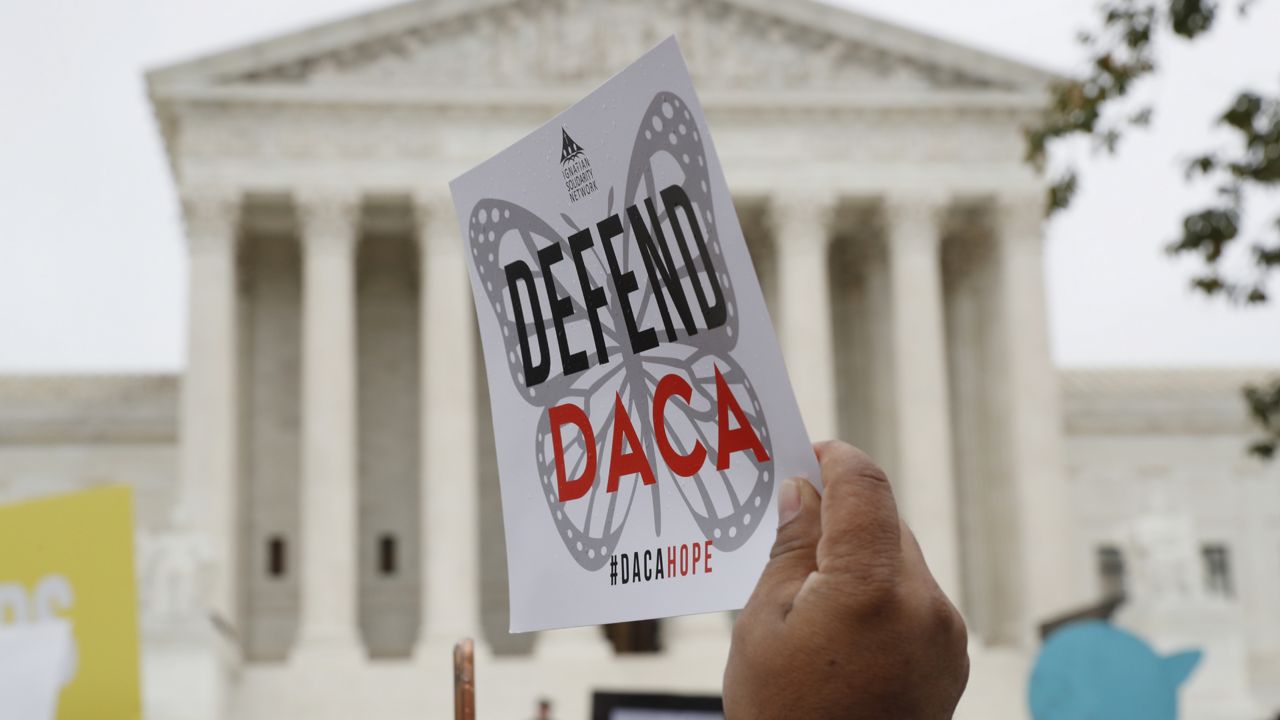A federal judge in Texas ruled that the Deferred Action for Childhood Arrivals (DACA) program is illegal and ordered President Joe Biden's administration to stop approving new applications.
In a statement issued Saturday, Biden called the ruling "deeply disappointing" and promised that the Department of Justice will appeal the decision.
U.S. District Judge Andrew Hanen ruled in favor of Texas and eight other conservative states that had sued to halt the Deferred Action for Childhood Arrivals program, which provides limited protections to about 650,000 people. People who are already enrolled won’t lose protections, but Hanen is barring the processing of new applications.
Hanen’s decision limits the immediate ability of Biden, who pledged during his campaign to protect DACA, to keep the program or something similar in place. His ruling is the second by a federal judge in Texas stopping Biden’s immigration plans, after a court barred enforcement of Biden’s 100-day stay on most deportations.
"In 2012, the Obama-Biden Administration created the Deferred Action for Childhood Arrivals (DACA) policy, which has allowed hundreds of thousands of young immigrants to remain in the United States, to live, study, and work in our communities," Biden wrote Saturday. "Nine years later, Congress has not acted to provide a path to citizenship for Dreamers."
"While the court’s order does not now affect current DACA recipients, this decision nonetheless relegates hundreds of thousands of young immigrants to an uncertain future," the president continued. "The Department of Justice intends to appeal this decision in order to preserve and fortify DACA. And, as the court recognized, the Department of Homeland Security plans to issue a proposed rule concerning DACA in the near future."
In a separate statement, Homeland Security Secretary Alejandro Mayorkas wrote Saturday that he is "disappointed by yesterday’s ruling and its impact on families across the country, but it will not derail our efforts to protect Dreamers."
"The Biden-Harris Administration—and this country—remain as committed as ever to ensuring that Dreamers are protected from the threat of deportation and are allowed to continue to contribute to this country that is their home," he continued. "DHS remains focused on safeguarding DACA, and we will engage the public in a rulemaking process to preserve and fortify DACA."
Biden, chiding Congress for not taking action in the 9 years since DACA was enacted, urged the legislature to provide a path to citizenship for Dreamers "that will provide the certainty and stability that these young people need and deserve."
"I have repeatedly called on Congress to pass the American Dream and Promise Act, and I now renew that call with the greatest urgency," he concluded. "It is my fervent hope that through reconciliation or other means, Congress will finally provide security to all Dreamers, who have lived too long in fear."
Biden has already proposed legislation that would provide a pathway to citizenship for the estimated 11 million people living in the U.S. without authorization. He also ordered agencies to make efforts to preserve the program.
The House approved legislation in March creating a pathway toward citizenship for those impacted, but the measure has stalled in the Senate. Immigration advocates hope to include a provision in sweeping budget legislation Democrats want to pass this year, but it’s unclear whether that language will survive.
Supporters of DACA, including those who argued before Hanen to save it, have said a law passed by Congress is necessary to provide permanent relief. Hanen has said Congress must act if the U.S. wants to provide the protections in DACA to recipients commonly known as “Dreamers.”
Hanen’s ruling came after he held a nearly 3 1/2 hour court hearing Dec. 22 on DACA’s fate.
The states argued that former President Barack Obama never had the authority in 2012 to create a program like DACA because it circumvented Congress. The states also argued the program drains their educational and healthcare resources.
Suing alongside Texas were Alabama, Arkansas, Kansas, Louisiana, Mississippi, Nebraska, South Carolina, and West Virginia — states that all had Republican governors or state attorneys general.
The Mexican American Legal Defense and Educational Fund and the New Jersey Attorney General’s Office, which defended the program on behalf of a group of DACA recipients, had argued Obama had the authority to institute DACA and that the states lacked the standing to sue because they had not suffered any harm due to the program.
Hanen had rejected Texas’ request in 2018 to stop the program through a preliminary injunction. But in a foreshadowing of his latest ruling, Hanen said in 2018 that he believed DACA as enacted was likely unconstitutional.
“If the nation truly wants to have a DACA program, it is up to Congress to say so,” Hanen wrote then.
Hanen ruled in 2015 that Obama could not expand DACA protections or institute a program shielding their parents.
While DACA is often described as a program for young immigrants, many recipients have lived in the U.S. for a decade or longer after being brought into the country without permission or overstaying visas. The liberal Center for American Progress says roughly 254,000 children have at least one parent relying on DACA. Some recipients are grandparents.
The U.S. Supreme Court previously ruled that former President Donald Trump’s attempt to end DACA in 2017 was unlawful. A New York judge in December ordered the Trump administration to restore the program as enacted by Obama.



